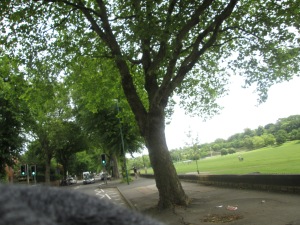“It’s nice around here, peaceful. You should see the castle.”
“Have you been?
“No, no, ha ha”. – me talking to an elderly Jamaican lady in St. Ann’s, Nottingham
Does history begin with a set of stories we tell ourselves about our place in the world? I’m increasingly thinking so, and it’s leading me to wonder how certain historical narratives get set in place.
I’ve been surprised by the frequency of St. George’s flags fluttering, usually in working-class suburban estates surrounding larger towns. Seeing them makes me feel uncomfortable and embarrassed, in the way similar to being out with a friend who unreasonably loses their temper and lashes out at some hapless victim. Yet as people have suggested to me, we don’t feel the same way when we see a Cornish flag in Truro, or a Jamaican flag, and so on. These don’t carry the same suggestions of aggression, parochialism and defensiveness. The model of Englishness on offer here doesn’t tally with the values many of us feel we hold.

































